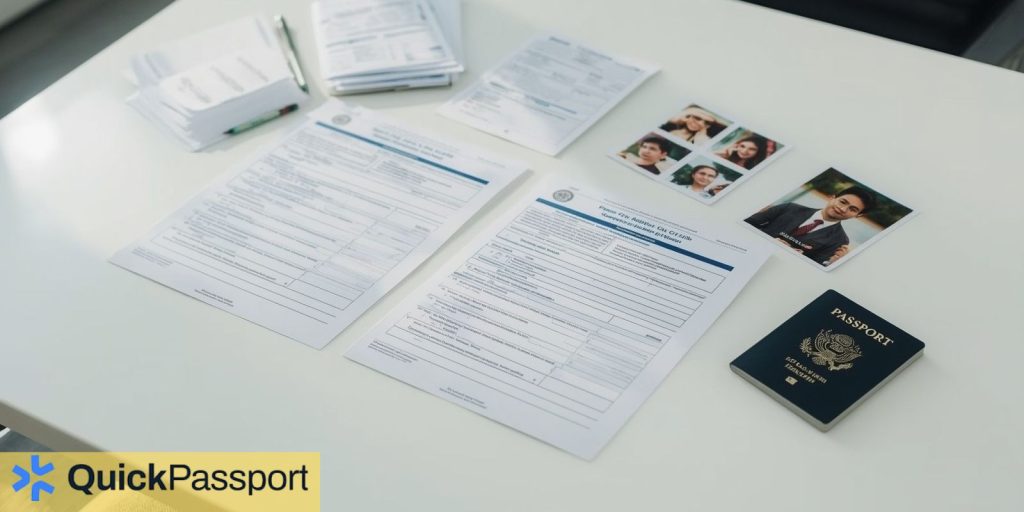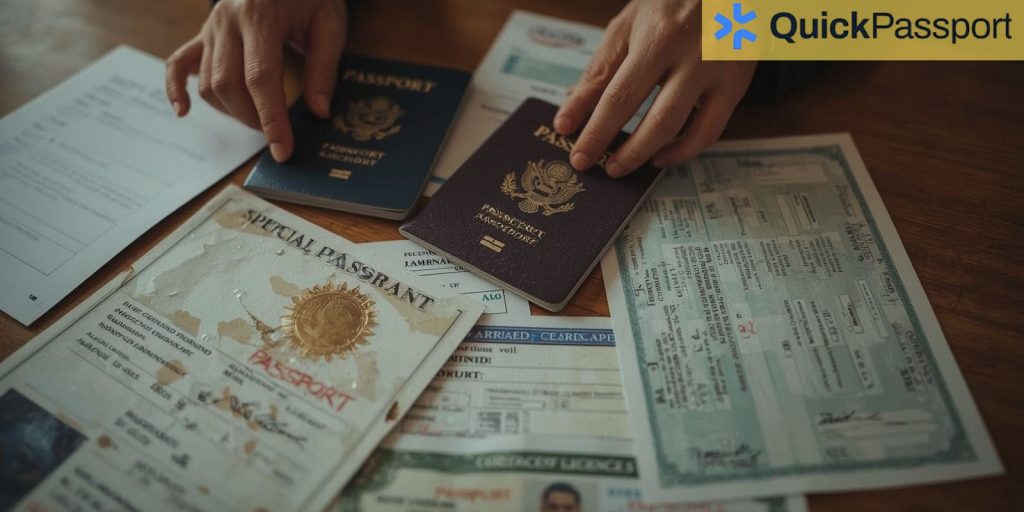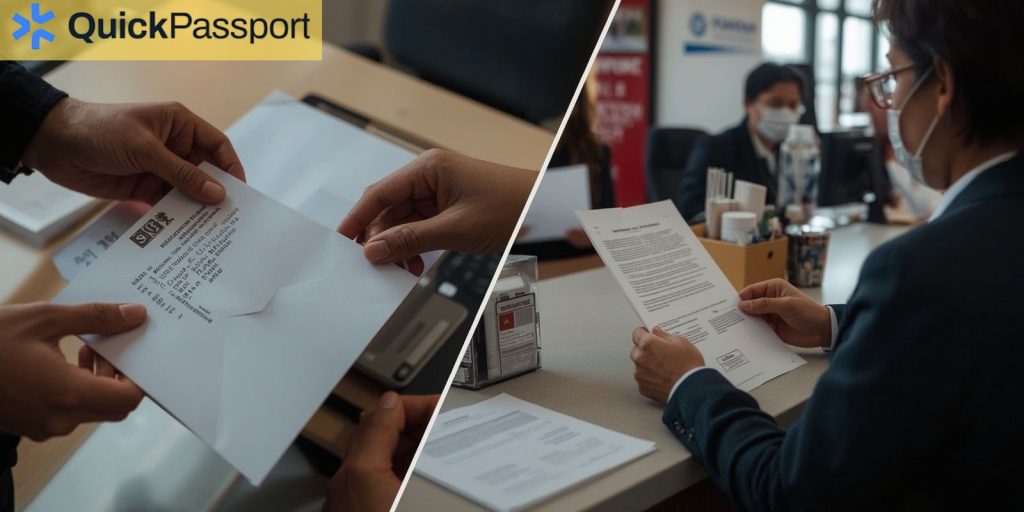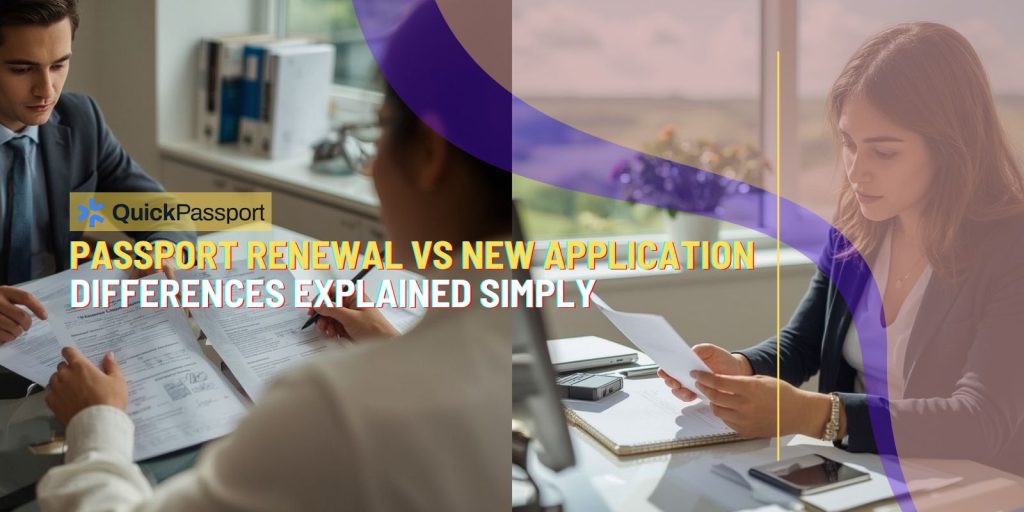Understanding the differences between passport renewal and new application processes is crucial for anyone planning international travel. Whether you’re a seasoned traveler looking to update your existing passport or someone preparing for their first international adventure, knowing which path to take can save you significant time, money, and frustration.
The passport application process in the United States involves two distinct pathways, each with its own set of requirements, timelines, and costs. Passport renewal is typically available for those who already possess a valid or recently expired passport that meets specific criteria, while new applications are required for first-time applicants or those whose previous passports don’t qualify for the renewal process.
Many travelers assume that renewing a passport is always the simpler option, but this isn’t necessarily true in every situation. The eligibility requirements for renewal are quite specific, and failing to meet even one criterion means you’ll need to go through the new application process instead. This distinction becomes particularly important when you’re working with tight travel deadlines or budget constraints.
The complexity of choosing between renewal and new application extends beyond just the basic requirements. Factors such as your age when the previous passport was issued, the condition of your current passport, any name changes, and how long ago your passport expired all play crucial roles in determining which process you’ll need to follow. Additionally, the application methods, required documentation, processing times, and associated costs vary significantly between these two options.
For residents of Arlington and surrounding areas, understanding these differences becomes even more important when planning your application strategy. Local passport acceptance facilities and processing centers have specific procedures for each type of application, and knowing what to expect can help you prepare more effectively and avoid common pitfalls that could delay your travel plans.
Key Takeaways
- Eligibility Requirements: Passport renewal is only available if your most recent passport was issued when you were 16 or older, was issued within the last 15 years, is undamaged, and you haven’t changed your name or can document the name change with a certified marriage certificate or court order.
- Application Methods: Renewals can typically be completed by mail using Form DS-82, while new applications require Form DS-11 and must be submitted in person at an acceptance facility with proper identification and citizenship documentation.
- Cost Differences: Passport renewals generally cost less than new applications since they don’t require the additional execution fee that acceptance facilities charge for processing new applications.
- Processing Times: Both renewal and new applications currently have similar processing timeframes, though renewal applications may have a slight advantage in certain circumstances due to the streamlined documentation requirements.
- Documentation Requirements: New applications require proof of U.S. citizenship and identity, while renewals primarily need your most recent passport and updated photos, making the documentation process significantly different.
- Photo Requirements: Both processes require new passport photos that meet current State Department specifications, but the submission process differs between mail-in renewals and in-person new applications.
- Name Change Considerations: If your name has changed since your last passport was issued, this significantly impacts whether you can renew or must apply as new, with specific documentation requirements for each scenario.
- Emergency Situations: When you need a passport urgently, the choice between renewal and new application can affect your expediting options and the speed at which you can receive your travel document.
Understanding Passport Renewal vs New Application Overview
The fundamental difference between passport renewal and new application lies in your previous passport history and current circumstances. Passport renewal is designed as a streamlined process for individuals who possess a valid or recently expired passport that meets specific criteria established by the U.S. Department of State. This process acknowledges that your identity and citizenship have already been verified through your previous application, allowing for a more simplified procedure.

New passport applications, on the other hand, are required when you’re applying for your first passport, when your previous passport doesn’t meet renewal criteria, or when significant changes have occurred since your last application. This process involves comprehensive identity and citizenship verification, as the State Department treats it as if you’re establishing your eligibility for passport privileges for the first time.
The renewal process typically involves completing Form DS-82, submitting your most recent passport, providing new photos, and paying the renewal fee. This can usually be done entirely by mail, making it convenient for most applicants. The State Department designed this process to be efficient because they already have your biographical information and citizenship documentation on file from your previous application.
New applications require Form DS-11, which must be submitted in person at a passport acceptance facility. You’ll need to provide primary evidence of U.S. citizenship, such as a certified birth certificate or naturalization certificate, along with acceptable identification documents. A trained acceptance agent will review your documents, witness your signature, and forward your application to the processing center.
The distinction becomes particularly important when considering processing times and costs. While both processes currently have similar timeframes, the requirements and potential complications differ significantly. Understanding which category you fall into before beginning your application can prevent delays and ensure you’re following the correct procedures from the start.
Eligibility Criteria and Requirements
Determining your eligibility for passport renewal versus requiring a new application depends on several specific criteria that must all be met simultaneously. The most critical factor is the age at which your most recent passport was issued. If you were under 16 years old when your current passport was issued, you cannot renew it regardless of other factors. This is because the State Department considers adult passports and minor passports as fundamentally different documents with different verification requirements.
The timeline of your previous passport issuance plays a crucial role in eligibility determination. Your most recent passport must have been issued within the last 15 years to qualify for renewal. This 15-year window is firm, and even if your passport expired just one day beyond this timeframe, you’ll need to submit a new application. The State Department established this timeline to ensure that the biographical and biometric information on file remains current and reliable.
Physical condition of your existing passport significantly impacts your renewal eligibility. The passport must be undamaged, which means no water damage, significant wear, missing pages, or alterations. Even minor damage that affects the passport’s integrity can disqualify you from renewal. This includes passports that have been washed, torn, or have pages that are coming loose. The State Department needs to verify the security features of your existing passport, which becomes impossible if the document is compromised.
Name changes present one of the most complex eligibility scenarios. If your name has changed since your passport was issued, you may still be eligible for renewal, but only under specific circumstances. You must be able to document the name change with acceptable evidence, such as a certified marriage certificate, divorce decree, or court-ordered name change document. If you cannot provide this documentation, or if you’ve had multiple name changes, you’ll likely need to apply for a new passport.
For new applications, eligibility is more straightforward but requires comprehensive documentation. You must prove U.S. citizenship through acceptable primary evidence and establish your identity through approved identification documents. First-time applicants, those whose previous passports don’t meet renewal criteria, and individuals who have had passports lost or stolen will need to follow the new application process. The requirements are designed to establish your eligibility from the ground up, ensuring the State Department has current and verified information about your citizenship and identity.
Application Process and Documentation
The application processes for renewal and new passports follow distinctly different pathways, each designed to match the level of verification required. Passport renewal applications center around Form DS-82, which can be completed online or printed and filled out by hand. This form focuses primarily on updating your information and confirming that your circumstances haven’t changed significantly since your last application. The beauty of the renewal process lies in its simplicity – most applicants can complete the entire process from home.

When submitting a renewal application, you’ll need to include your most recent passport, which serves as both your application for the new passport and proof of your previous successful verification. This passport will be cancelled and returned to you along with your new passport. You’ll also need to provide two identical passport photos that meet current State Department specifications, which include specific size, background, and quality requirements that have evolved over the years to meet enhanced security standards.
New passport applications require a more comprehensive approach, starting with Form DS-11, which must be completed in person at an acceptance facility. These facilities include post offices, libraries, courthouses, and other locations where trained acceptance agents can verify your documents and witness your signature. The in-person requirement exists because the State Department needs to verify your identity and citizenship documentation through a trained professional who can detect potential fraud or document issues.
Documentation for new applications involves two primary categories: proof of citizenship and proof of identity. Citizenship documentation must be an original or certified copy of a primary document such as a birth certificate issued by the vital records office, a consular report of birth abroad, a naturalization certificate, or a certificate of citizenship. These documents must be in excellent condition and clearly legible, as any questions about their authenticity can delay processing significantly.
Identity verification for new applications requires a different set of documents, typically including a valid driver’s license, government employee ID, or military ID. The key requirement is that the identification document must be current, contain your signature and photograph, and be in good condition. If you don’t have acceptable primary identification, you can use a combination of secondary documents, but this process becomes more complex and may require additional verification steps.
The submission process also differs significantly between renewals and new applications. Renewal applications can be mailed directly to the processing center using a trackable mailing method, giving you control over the timing and method of submission. New applications must be submitted at acceptance facilities during their operating hours, which may require scheduling appointments and coordinating with facility availability, particularly during peak travel seasons.
Cost Analysis and Processing Times
Understanding the financial implications of passport renewal versus new application helps travelers budget appropriately and make informed decisions about their application timing. Passport renewal applications typically cost less than new applications because they don’t require the additional services of an acceptance agent. The renewal fee covers the cost of producing your new passport and processing your application through the mail-in system that the State Department has streamlined for efficiency.
New passport applications involve two separate fees: the passport application fee and the execution fee. The application fee covers the cost of producing your passport and processing your application through the more comprehensive verification system required for new applicants. The execution fee compensates the acceptance facility for the services of their trained agent who reviews your documents, verifies your identity, and ensures your application is complete and accurate before forwarding it to the processing center.
Processing times for both renewal and new applications have become more standardized in recent years, though they can fluctuate based on seasonal demand and operational factors. The State Department publishes current processing time estimates on their website, which typically range from several weeks to a few months for routine service. These timeframes apply to applications submitted with all required documentation and no complications that would require additional review or verification.
Expedited processing is available for both renewal and new applications at an additional cost, which can significantly reduce processing times when you have urgent travel needs. However, expedited service doesn’t guarantee a specific delivery date, and the actual processing time depends on the current workload at the processing facilities. During peak travel seasons, even expedited applications may take longer than the estimated timeframes, making early application submission crucial for time-sensitive travel plans.
The cost-effectiveness of renewal versus new application extends beyond the basic fees to include indirect costs such as transportation to acceptance facilities, time off work for in-person appointments, and potential expediting fees if delays occur. Renewal applications eliminate many of these indirect costs since they can be completed entirely by mail, making them not only less expensive but also more convenient for most applicants.
Payment methods also differ between the two processes. Renewal applications typically require a single payment method for the renewal fee, while new applications may require separate payments for the application fee and execution fee, depending on the acceptance facility’s procedures. Some facilities accept credit cards, while others may require checks or money orders, adding another layer of preparation required for new applications.
When considering expedited processing, it’s important to factor in additional costs such as overnight shipping for renewal applications or expedited return shipping for new applications. These services can add significantly to the total cost but may be necessary when working with tight travel deadlines. The decision between standard and expedited processing should consider both the additional cost and the realistic timeline for receiving your passport based on current processing estimates.
Common Scenarios and Special Circumstances
Real-world passport application scenarios often involve complications that don’t fit neatly into the standard renewal or new application categories. Understanding these special circumstances helps applicants navigate the process more effectively and avoid common pitfalls that can delay their travel plans. One of the most frequent complications involves travelers who assume they’re eligible for renewal but discover during the application process that they actually need to submit a new application.

Name changes represent one of the most complex scenarios in passport applications. If you’ve recently married and want your passport to reflect your new name, the process depends on several factors including how recently your current passport was issued and whether you have acceptable documentation of the name change. Recent marriages with certified marriage certificates typically allow for renewal, but older name changes or multiple name changes often require new applications with comprehensive documentation of your name history.
Lost or stolen passports automatically require new applications, regardless of when the passport was issued or how recently it was obtained. This situation requires additional steps including reporting the loss or theft to the State Department and potentially to local law enforcement if the passport was stolen. The new application process for lost or stolen passports includes extra verification steps to prevent fraudulent use of your passport information, which can extend processing times beyond the standard estimates.
Damaged passports present unique challenges that require careful evaluation of the extent of damage. Minor wear and tear might still qualify for renewal if the passport’s security features remain intact and readable. However, significant damage such as water damage, torn pages, or separated binding typically requires a new application. The determination often depends on whether acceptance agents can verify the passport’s authenticity and security features, which becomes impossible with severely damaged documents.
International travelers who need passport services while abroad face different procedures entirely, typically involving U.S. embassies or consulates. These situations often require new applications regardless of renewal eligibility, as overseas facilities have different capabilities and security requirements. Emergency passport services abroad focus on enabling immediate travel rather than providing full-term passports, often requiring additional applications once travelers return to the United States.
Children’s passport situations involve unique considerations since minors under 16 cannot renew passports and must always submit new applications. Additionally, children’s passport applications require consent from both parents or legal guardians, adding complexity to the documentation and application process. These requirements remain in effect until the child reaches 16 years of age, at which point they can begin using the renewal process for subsequent passport updates.
For Arlington residents and those in the greater Washington D.C. area, proximity to federal facilities and international airports creates additional considerations for passport applications. The high volume of international travelers in the region means that local acceptance facilities often have extensive experience with complex cases, but it also means that appointment availability can be limited during peak travel seasons. QuickPassport – Arlington specializes in helping local residents navigate these regional considerations and can provide guidance on the most efficient application strategies based on current local processing conditions and facility availability.
Frequently Asked Questions
Can I renew my passport if it expired more than 5 years ago?
Yes, you can renew your passport even if it expired more than 5 years ago, as long as it was issued within the last 15 years and meets all other renewal criteria. The 15-year window is the critical factor, not when the passport actually expired.
What happens if I submit a renewal application but I’m not eligible?
If you submit a renewal application but don’t meet the eligibility requirements, the State Department will return your application and fee, requiring you to resubmit using the new application process. This can significantly delay your passport receipt.
Can I use my maiden name passport for renewal after marriage?
You can renew a passport in your maiden name if you provide a certified marriage certificate with your renewal application. However, if you cannot provide acceptable name change documentation, you’ll need to submit a new application.
Is expedited processing available for both renewal and new applications?
Yes, expedited processing is available for both types of applications at an additional fee. However, processing times and availability may vary based on current demand and operational factors at processing facilities.
Do I need an appointment for passport renewal?
No, passport renewals can typically be completed by mail and don’t require appointments at acceptance facilities. Only new applications require in-person submission at acceptance facilities, which may require appointments.
Can I renew my passport if pages are missing?
No, passports with missing pages cannot be renewed and require new applications. Missing pages compromise the passport’s security features and integrity, disqualifying it from the renewal process.
What if my child’s passport was issued when they were 15?
Children’s passports issued before age 16 cannot be renewed regardless of the child’s current age. Once the child reaches 16, they must submit a new application, but subsequent passports can then be renewed following standard adult renewal procedures.
How do I know if my passport damage disqualifies renewal?
Significant damage including water damage, torn covers, loose binding, or damaged security features typically disqualifies renewal. Minor wear and tear may still qualify, but when in doubt, it’s best to consult with passport professionals or submit a new application to avoid delays.
Conclusion
Understanding the differences between passport renewal and new application processes is essential for efficient travel planning and avoiding unnecessary delays or complications. The key factors determining which process you’ll use include your previous passport’s age, condition, and issuance circumstances, along with any changes in your personal information since your last application. While renewal offers a more streamlined and cost-effective option for eligible applicants, new applications provide a comprehensive verification process for those who don’t meet renewal criteria.
The decision between renewal and new application isn’t always straightforward, and many travelers benefit from professional guidance to ensure they choose the correct process from the start. Factors such as name changes, passport damage, timing constraints, and special circumstances can significantly impact which option is available and most appropriate for your situation. Taking time to carefully review the eligibility requirements and gather appropriate documentation before beginning your application can save considerable time and frustration.
For residents of Arlington and surrounding areas, QuickPassport – Arlington provides expert assistance in navigating these complex decisions and ensuring your passport application process proceeds smoothly. Whether you’re eligible for renewal or need to submit a new application, professional guidance can help you avoid common pitfalls and optimize your application strategy based on your specific travel timeline and circumstances. With proper planning and understanding of the process differences, you can obtain your passport efficiently and be ready for your next international adventure.






